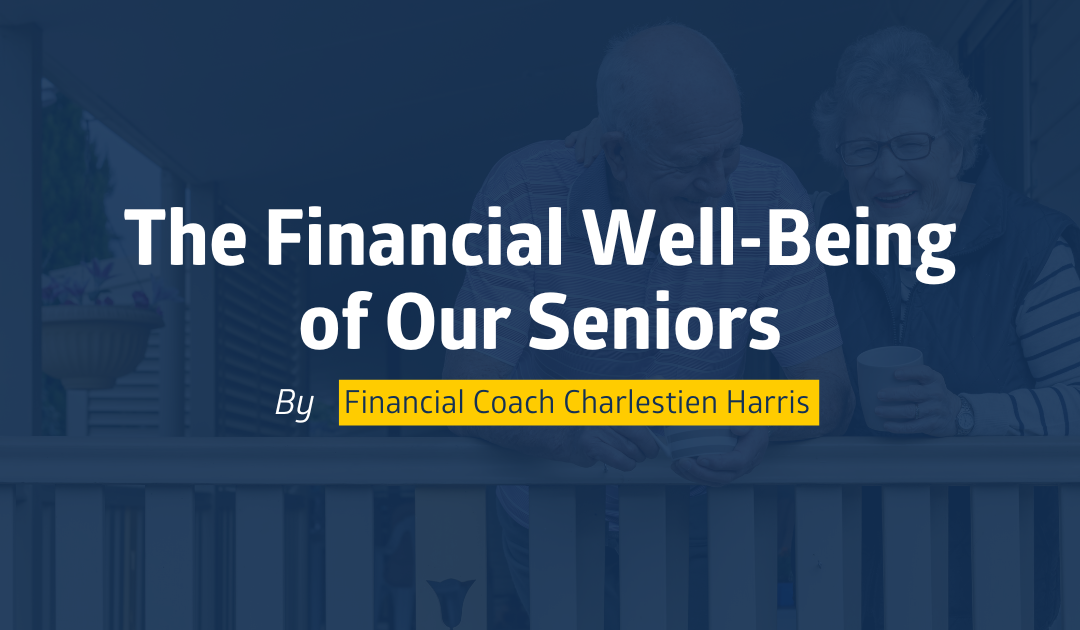By Charlestien Harris
May is the month when May flowers spring up from the April showers, says the age-old adage. May is also celebrated as Older Americans Month. This month is all about giving older Americans a voice and focusing on their needs and ways to make their lives more enjoyable. Aging issues are often overlooked by many, so it is important to dedicate a special month just for them.
There are several issues that can affect the quality of life for our senior citizens. One area of concern for me is the financial well-being of older Americans. I want to bring attention to some of those concerns and hope you will consider joining me in recognizing these issues and being willing to learn more, so you can possibly assist a senior citizen living in your community or maybe direct them to resources you read about in this article.
Here are a few suggestions you might consider when gathering information to give to a senior citizen.
1. You can help to prevent fraud.
Losing money or possessions to scams, fraud, and exploitation can be especially devastating to older adults, who may not be able to earn back what they’ve lost. Several thousand seniors fall victim to some type of theft or fraud each year. One way you can assist them is to make them aware of the many scams and deceptive practices that can fleece them of their hard-earned money, savings, or retirement funds. You can find a lot of great information on the Consumer Financial Protection Bureau at https://www.consumerfinance.gov/consumer-tools/educator-tools/resources-for-older-adults/protecting-against-fraud/. The site has resources for consumers, caregivers, and service providers, as well as financial institutions.
2. You can help to protect a senior from elder financial abuse.
What is elder financial abuse? It is a question that many of you may not have thought about as a risk to a senior you know. It’s a crime that deprives older adults of their financial resources and eventually their very independence. When you see signs of theft, fraud, misuse of a person’s assets or credit, or use of undue influence to gain control of an older person’s money or property, you should be on the alert. These signs can be an indication of possible exploitation. One other factor that can defraud a senior is the advances in technology, which can also make it difficult for seniors to know who to trust and what is considered a safe financial transaction. Another website that has plenty of information for you to share can be found on the American Banker Association’s site at https://www.aba.com/advocacy/community-programs/consumer-resources/protect-your-money/elderly-financial-abuse. This site shares several tips that can be very helpful when trying to help a senior avoid this type of financial abuse.
3. You can provide information about identity theft.
This is also an enormous problem when it comes to the elderly population. Seniors can sometimes be caught off guard by a sudden phone call asking for personal information or by online predators just waiting to steal their personal information to use for their own personal gain. Seniors can be most vulnerable because they can be so trusting when it comes to a friendly voice or a chance at a once-in-a-lifetime offer. These are classic examples of identity theft that often trap our seniors, and they may not even realize that they have become victims. The Federal Trade Commission’s website has a vast amount of information that can be found at https://consumer.ftc.gov/features/identity-theft. Take a look and see what you can share with your loved ones or other seniors you may know.
4. You can learn as much as you can about Reverse Mortgages.
Some older adults may consider getting a reverse mortgage. A reverse mortgage is a mortgage loan, usually secured by a residential property, that enables the borrower to access the debt-free portion of the property. The loans are typically promoted to older homeowners and typically do not require monthly mortgage payments. The only reverse mortgage insured by the U.S. Federal Government is called a Home Equity Conversion Mortgage (HECM) and is only available through an FHA-approved lender. The HECM is FHA’s reverse mortgage program that enables you to withdraw a portion of your home’s equity. Older adults can face difficulty keeping up with homeowners’ insurance or property taxes, which puts them in danger of losing their homes while still owing money. You can get more information about this type of mortgage by speaking with a HUD Certified counselor located at a HUD-approved counseling agency. You can visit https://www.hud.gov/program_offices/housing/nationally_hud_approved_housing_counseling_agenciesdirectory.
Southern Bancorp is a HUD-approved counseling agency, and we have four HUD-certified housing counselors on staff available to assist with your housing or financial questions. Seniors need people like us to keep an eye out for them and to be able to provide them with accurate information so they can avoid scams, deceptive practices, and other financial traps that can ruin their lives.
If you need additional information on this or other financial topics, you can contact me at Charlestien.Harris@testbanksouthern.aceone.io or call me at 662-624-5776.
Until next week – stay financially fit!

